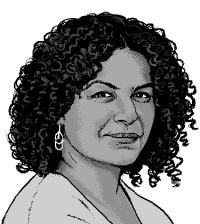A word that helps keep me rooted as the child of immigrants
Nadhe is a longing and a hope, a heaven and a solid place on earth.

Nadhe. It was a treasured word in my immigrant family when I was growing up. A yearning word, shot through with loss, hope, and nostalgia. Though it has no straightforward equivalent in English, I continue to search for a satisfying translation: Land. Earth. Countryside. Birthplace. None of these will do. Maybe the closest English can offer is this impossibly beautiful phrase from the 1979 Book of Common Prayer: “This fragile earth, our island home.”
If I close my eyes, the South Indian (Malayalam) word blooms in precise, Technicolor memory: Stunningly green rice paddies. Coconuts so tender, my grandmother scooped out their insides like pudding. The heavy, too sweet scent of jackfruit, rotting in the sun. Sheets of water falling from the sky during the monsoon. The cool, mossy darkness of the family well—forbidden to curious children.
Read our latest issue or browse back issues.
When my parents emigrated from India in the 1970s, they left behind a way of life—and a way of faith—rooted in the earth. Both of my grandfathers were farmers as well as preachers. Sowers of the word as well as sowers of, oh, just about everything: peppers, mangoes, bananas, coffee. Cashews, cassava, cardamom.
During childhood visits to Kerala, I’d follow my grandparents around as they worked, their chores an endless source of fascination. I’d stroke the soft-eyed cows and chase the hens. I’d watch in wonder when my grandfather collected “milk” from his rubber trees and hold my breath when an uncle shimmied up a scary-high palm tree to fetch a coconut. I’d run away from insects with “too many legs” but run to “help” when a goat or a cow gave birth.
In the sweaty, soil-stained busyness of their days, I doubt my grandfathers stopped to philosophize much about their dual vocations. They simply preached and sowed, prayed and harvested—stewarding creation with one hand as they fed God’s flock with the other. Working gently with the soil, water, trees, and animals held no political meaning for them. Stewardship of the earth was less an ideological agenda than a full-body, full-soul vocation. It was the holy air they breathed.
Things changed, of course, when my parents moved to urban and then suburban America. Though they cultivated a vegetable garden behind every house we lived in, and though we visited India as often as we could afford, something vital—something old, deep, and sustaining—eluded us. I had no words for the loss when I was little, but I felt the shadow it cast over us. Hence the yearning and nostalgia. Hence, nadhe.
Like many adult children of immigrants, I circle around the missing something, trying to pin it down. It’s more than dislocation or homesickness. More than the trauma of leaving a mother tongue behind. It’s tied to the earth itself, to an untethering from land, trees, soil, and sky. For my grandparents, nadhe was unromantic; it was simply the ground beneath their feet—the soil under their fingernails, the homegrown fruits and vegetables that filled our stomachs, the well water we drew each morning, the stable geography of an organic and reciprocal belonging. When they sang worship songs about eternity, the word they used for heaven was the same word they used to describe the mango groves behind their houses: nadhe. Not pie-in-the-sky, not abstraction. A real and solid place. An island home.
I sometimes hear Christians speak of our earthly life—and even the earth itself—as a way station. “We are pilgrims and sojourners,” they say. “This world is not our home.” Or I hear the notion of stewardship distorted to mean something closer to exploitation. As if the earth is a giant flea market or outlet mall, offering us everything we crave at an easy discount.
But isn’t the earth given to us precisely to teach us what home is? Didn’t the incarnation tear down once and for all the dividing wall between earth and heaven, body and spirit, sacred and secular? Isn’t creation in all of its myriad particulars our best classroom for God’s character, God’s loves, God’s sorrows, God’s priorities?
What my parents lost when they left India was not a few acres of land. They lost their daily proximity to a nourishing earth. They lost a kind of rootedness. Perhaps it’s because my grandparents were so deeply rooted to their earthly nadhe that they were able to profess faith in a heavenly one so easily.
I was not born with a green thumb, despite my heritage. At this moment, I have two tiny curry leaf plants growing on my patio, and I literally pray each day that my bumbling version of care won’t kill them. But I only need to breathe in their sharp, peppery scent for a second before I am transported—just as surely as I’m transported on Sunday mornings by liturgy. I feel a similar awe at the stunning California landscapes that surround me. I love forests, mountains, deserts, and beaches. I love the sky at night and the clouds before a storm. I can stand forever in front of a waterfall.
If it weren’t for my childhood memories of India—of watching my grandparents shape a whole liturgy around seed, river, tree, and riverbank—I might not know to associate these loves with God. But God infuses them. God is everywhere in God’s good creation. These days, when I wade in a lake or hike a forest trail or admire a thousand-year-old redwood, I try to remember that I’m on holy ground, glimpsing the face of God. The God of my fragile but precious nadhe.
A version of this article appears in the print edition under the title “Our precious nadhe.”






